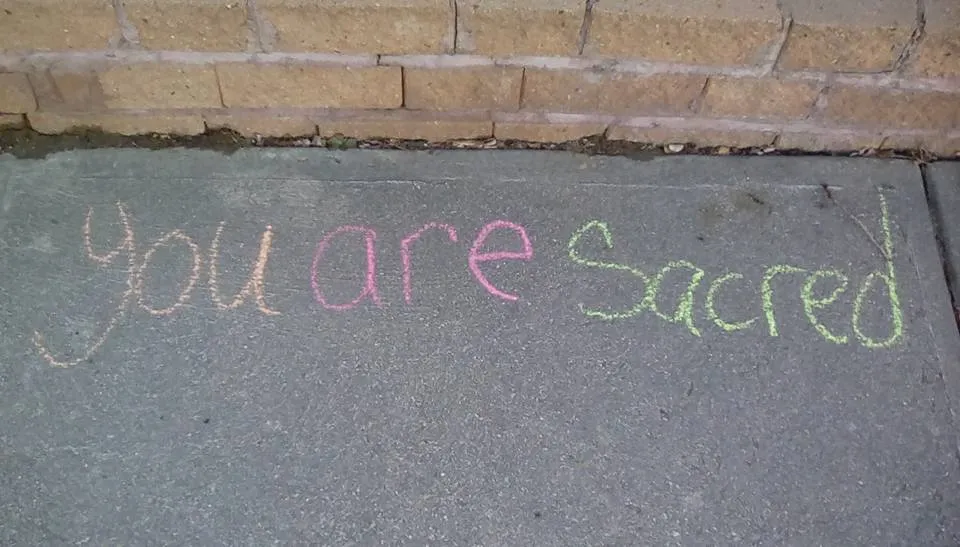When we are on a spiritual, healing, or self improvement journey, we read, meditate, and focus a lot on compassion. We say mantras, we meditate on it, we think of ways in which we can be more compassionate in our lives toward others, animals, and the whole world. But too often, we don't ever consider compassion for ourselves. The assumption is that we're selfish creatures, pursuing our own desires and goals, and that we need to focus our compassion outward since we already spend so much energy on ourselves. Of course, it is important to show compassion to others, but pursuing your own goals doesn't necessarily mean that you have compassion for yourself. Think about how many people's goals have nothing to do with it: your goal is to get a degree so that you can get a good job, perhaps. So you work yourself to the bone, neglecting your health, sleep, relationships, and everything else to put all of your focus and energy into that big goal. Is that compassionate toward yourself? It sure isn't. Putting off your wellness and happiness today for an imagined happiness in the future when (and if!) you achieve your goal is actually quite cruel. No one is guaranteed tomorrow, for one; your sleep-deprived butt might get hit by a bus crossing the street. Two, you might not achieve that particular goal for any number of reasons; life has a way of derailing sometimes. Three, you might achieve it and get that good job, only to find that it's unfulfilling and you spent all those years working toward it only to have no real reward for your efforts. Four, perhaps you might have found a different path that would have given you true happiness if only you weren't so fixated on this one specific goal you had set your heart on. Maybe you would have been a successful artist but you gave up your art because you didn't think you could earn a living doing that; maybe you would have met the love of your life if you had taken the time to build relationships instead of doing nothing but study. The point is, what is seen as a myopic, self-interested fixation on a goal for your own sake is not indicative of any compassion for one's self at all. Sometimes it's quite the opposite.

There is a presumption in self-improvement and spirituality circles that we're all just swimming in self love, when often what brings us to these circles is a stagnant pool of self hate. We are suffering from trauma and depression, blame ourselves (as our society generally instructs us to do), and start on the path seeking to heal. When we're told on those paths that humans are inherently selfish, and that enlightenment and peace can only come by dissolving your self, the very thing we loathe to begin with, that can get very self destructive, very fast. When you think your self is broken, bad, evil, and worthless going in, and then you are told to essentially kill it? You have just been given a spiritual justification for your unhealthy coping mechanisms - and perhaps even ramp them up.
Think about traditions of what is called in Christianity, corporeal mortification. That includes everything from fasting to people who flog themselves. So many saints firmly believed they were inherently evil and sinful, and essentially tortured themselves as a penance. Today if someone engaged in such extremes as many medieval saints did, they would be labeled anorexic or perhaps some other disorder and advised to seek medical help. These people had much compassion for others in the world and for Jesus, but not for themselves. People may admire their devotion, but you couldn't call it self love.
Now I'm not dismissing any of these practices outright; there's nothing wrong with doing a fast or what have you, but today even the Catholic church is very hesitant about the more extreme types of mortification of the flesh. You're supposed to get express permission from your confessor; people with scrupulosity are advised not to do mortifications as a rule, etc. You probably couldn't be a medieval-style saint today; they'd send you to a psychiatrist. They recognize a difference between a healthy amount of sacrifice and harmful excess.

wakka wakka wakka!
Last month, we here in the Natural Medicine community had a discussion about balance. That also needs to apply here. If you do genuinely believe yourself to have an outsized ego and not enough compassion for others, then for sure, the focus on outward compassion and learning some humility could help you. But if you're full of self loathing and low self esteem, it's probably not the practice you need as much as learning to accept all the parts of yourself that you currently deny. Again, I'm not saying, "go be selfish," I don't want you to give up your mutual aid efforts or being kind and considerate to others. I'm just saying, if this is you, you might have a tendency to "give until it hurts" and self-sacrifice to an unhealthy level. You deserve compassion, too.
I've been learning a bit about how neglect in early childhood can lead to self hate. Basically, when you're a child, if your caregivers don't care for you as they should when you are helpless and wholly dependent on them, a wee little kid doesn't look at that situation and think, "wow, my parents sure are messed up," they think, "I'm bad and don't deserve love." They try even harder to please, because the instinct is to imagine that there is something wrong with you instead of them. Of course, when you're a five year old or whatever, you could not have possibly done anything so wrong as to "deserve" abuse or neglect. But your child brain doesn't know that. Your child brain thinks, if I am good and do well in school and helpful and quiet and whatever else you think might please your caregivers, then they will love me. You think you can fix it if you make them happy.
This coping mechanism for a childhood where you were not cared for becomes your inner monologue, and as you grow into adulthood, you basically continue to abuse yourself. When you mess up, your inner voice tells you that you're stupid, that you never do anything right, instead of realizing that everyone messes up sometimes and that's just a part of life. If you came from an abusive household and you get into an abusive romantic relationship, you see that as confirmation that you deserve it. If you were constantly told to shut up and that "children should be seen and not heard," you don't speak up and defend yourself as an adult. Etc. You weren't shown compassion, and so you give yourself none.
But if this life is all about love - which, as I mentioned in a post a couple of days ago, people who have near death experiences assure us it is, then that includes yourself. If we are all one, if we are all part of a sacred whole ...then that includes yourself. You are not somehow less than every other creature on the planet. It's not, everyone is part of the sacred oneness except you. You are divine, too.

The whole point of "dissolving the self" or "killing the ego," phrase it how you want, is to recognize that we are all part of the whole, that we are all connected. You cannot do that if you are holding yourself apart because you think you are somehow faulty anymore than if you are holding yourself apart because you think you're the best thing since sliced bread. The result is the same: you see yourself as different and separate. That is the illusion.
Compassion has to include yourself. You are not broken. You are beautiful. And you deserve love.
